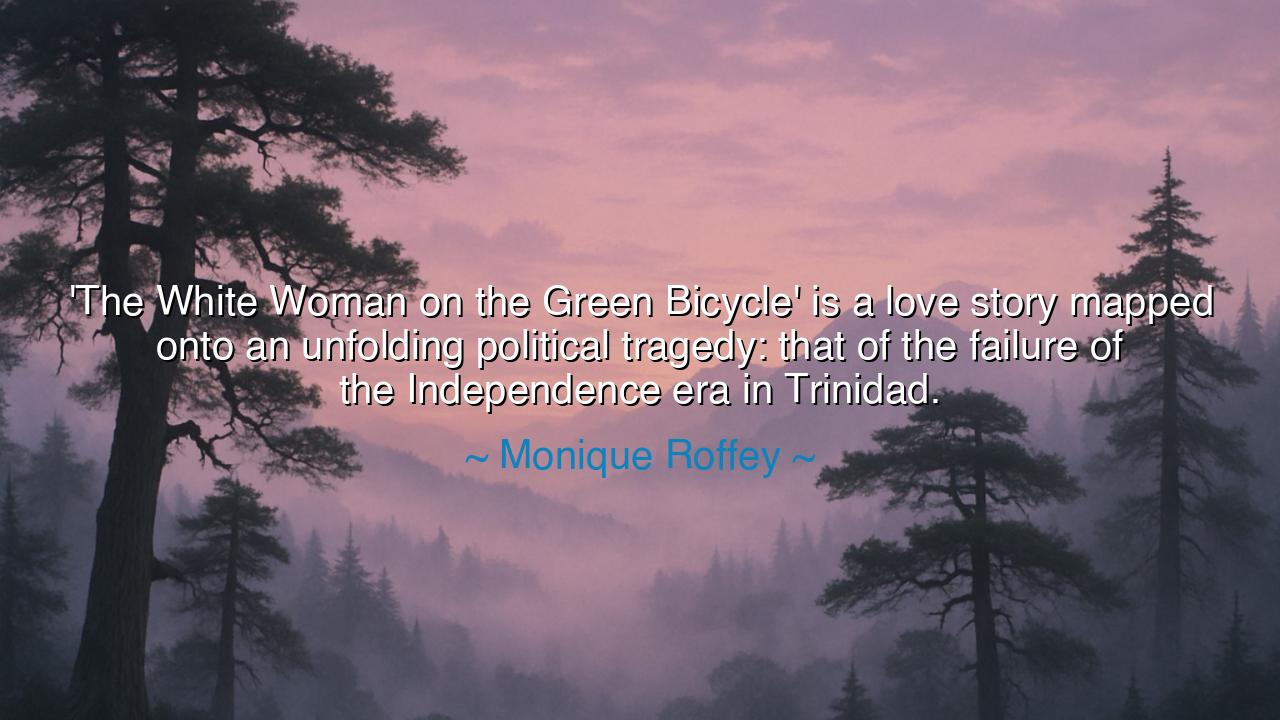
'The White Woman on the Green Bicycle' is a love story mapped
'The White Woman on the Green Bicycle' is a love story mapped onto an unfolding political tragedy: that of the failure of the Independence era in Trinidad.






The words of Monique Roffey, author of The White Woman on the Green Bicycle, shimmer with both tenderness and lament. When she said, “‘The White Woman on the Green Bicycle’ is a love story mapped onto an unfolding political tragedy: that of the failure of the Independence era in Trinidad,” she was describing more than her novel—she was speaking of the heartbreak of nations and the fragile union between people and the lands they inhabit. Her words echo the eternal truth that love and politics, heart and history, are often entwined: that when a country loses its way, the people who love it most suffer the deepest wounds.
To grasp her meaning, one must know the story beneath her story. The White Woman on the Green Bicycle tells of a marriage between a British woman, Sabine, and her husband, George, who emigrate to Trinidad in the waning days of the British Empire. At first, Sabine is enchanted by the island—the lush greenery, the colors, the pulse of life—but as time passes and Trinidad gains independence, the dream turns uneasy. The politics of the young nation grow turbulent, the promises of freedom begin to sour, and the divisions of race and class deepen. What begins as a love story between a woman and a man becomes a mirror for a greater, more painful story—the love between colonizer and colony, between ideal and reality, between hope and history.
Roffey’s words speak to the tragedy of postcolonial disillusionment—the heartbreak that often follows the euphoria of freedom. When nations cast off their chains, they imagine a paradise reborn, a society healed of injustice. But too often, independence brings not harmony but struggle; leaders become tyrants, economies falter, and corruption grows where idealism once bloomed. In Trinidad, as in so many nations of the Caribbean and Africa, the dream of self-rule collided with the reality of human frailty. The failure of the Independence era, as Roffey calls it, was not merely political—it was emotional, spiritual. It was the story of people who believed in a future of light, only to find themselves still walking in the shadows of empire.
And yet, Roffey frames this tragedy as a love story. Why? Because love is the truest measure of loss. Sabine’s love for Trinidad mirrors the affection many outsiders felt for the lands they once ruled or inhabited—the fascination, the longing, the desire to belong. But her love, like the colonizer’s, is flawed—it cannot be pure, for it is entangled with privilege, misunderstanding, and guilt. She rides her green bicycle through the streets of Port of Spain as both observer and stranger, unable to shed her foreignness, yet unable to leave. In this, Roffey reveals the painful paradox of postcolonial identity: that both the colonizer and the colonized are bound together by history, love, and resentment, unable to separate without tearing a piece of themselves away.
The history of the world is filled with such love stories turned tragedies. Consider India, newly freed from British rule in 1947, when dreams of unity were soon broken by Partition, a division that left millions dead or displaced. The love of a people for their homeland was torn apart by politics and prejudice. Or think of Zimbabwe, once jubilant in independence, later betrayed by its own leaders. In every instance, the promise of freedom was tested by the burden of rebuilding, and the story of nations became a story of broken hearts. So too in Trinidad, where the hopes of the people were dimmed by corruption and unrest, where the spirit of independence gave way to cynicism. Roffey’s novel captures that ache—the sense that even paradise can lose its shine when innocence is gone.
In the voice of the ancients, we may say: love is the seed of freedom, but it must be tended with truth. When a people forget what they fought for, or when power replaces purpose, the garden of independence withers. Yet Roffey’s reflection carries not only sorrow, but a call to remembrance. She teaches that the spirit of independence is not a moment in time, but a living relationship—one that must be renewed, nurtured, and defended with every generation. Just as lovers must learn to listen and forgive, so too must nations learn to honor their past while building a just and inclusive future.
The lesson, then, is twofold: love and liberty are never complete—they are always becoming. To love a person or a nation is to see its flaws and remain devoted to its better self. The failure of independence is not final; it is a warning, a reminder that freedom is not the absence of rule, but the presence of responsibility.
And so, the practical path is this: love your country not as an idol, but as a work in progress. Hold its leaders accountable, yet never abandon faith in its soul. Remember, as Monique Roffey teaches through her story, that even amid political tragedy, the act of love—whether for a person, a nation, or an ideal—remains the most radical form of hope. For though the white woman’s bicycle may rust, and the dreams of independence may falter, the human spirit, ever striving for connection and renewal, cannot die.






AAdministratorAdministrator
Welcome, honored guests. Please leave a comment, we will respond soon